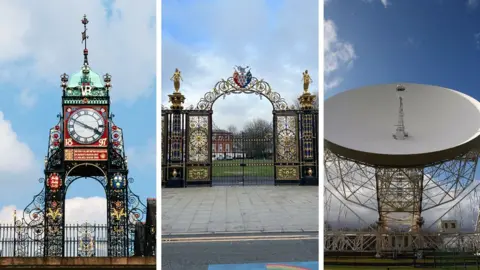What will devolution mean for people in Cheshire?
 BBC/Getty Images
BBC/Getty ImagesCheshire and Warrington looks set to move forward with its devolution plan and to elect a mayor.
It was named as one of six places added to the government's devolution priority programme on Wednesday.
But what does it all mean for the almost one million people who live in the area?
What is devolution?
Put simply, it is all about transferring a range of powers from Westminster.
The premise is that decisions are best made by politicians who have their ears closest to the ground.
The idea has been around in England for more than a quarter of a century now.
Following a referendum in 1998, London elected its first directly elected mayor two years later.
What about in the north-west of England?
Greater Manchester signed a devolution deal in 2014, with the Liverpool City Region following a year later.
Both regions elected their first mayors in 2017. In Greater Manchester, Andy Burnham won a third term in last year's elections, a feat matched by his Labour colleague Steve Rotheram in the Liverpool City Region.
Following much wrangling, Lancashire's combined authority was officially launched on Wednesday although no agreement has yet been made about whether the county will have an elected mayor.
Deputy Prime Minister Angela Rayner said: "Lancashire is already deciding its mayoral devolution options and we will look at their proposals in the autumn."
What is a combined authority?
A combined authority brings together existing councils but does not replace them.
Instead, they are designed to allow councils to co-operate on a range of issues which affect a wider area, such as transport and pursuing economic growth.
Combined authorities are created by government legislation.
Where would a Cheshire devolution deal cover?
The agreement - and combined authority - will cover three council areas, namely Cheshire East, Cheshire West and Chester, and Warrington.
Looking at the numbers, we are looking at 870 square miles (2,253 sq km) and a population of about 990,000.
It should be noted that while Halton Borough Council is in the ceremonial county of Cheshire rather than Merseyside, it chose to join the devolved Liverpool City Region in 2015.
What powers is Cheshire expected to have?
The combined authority is expected to have powers in seven broad areas, namely:
- Transport
- Skills and employment support
- Housing and strategic planning
- Economic development and planning
- Environment and climate change
- Health, wellbeing and public sector reform
- Public safety
Transport is a big one - the combined authority could be able to take control of public transport.
This could either involve the introduction of local bus franchising, like Greater Manchester's Bee Network, or the formation of a municipal bus company.
The combined authority is likely to receive funding to run all non-apprenticeship adult skills programmes and be obliged to work to a local sustainable growth plan.
It will also work with the Police and Crime Commissioner (PCC) for Cheshire on public safety, with the PCC becoming a non-voting member of the combined authority.
Will Cheshire have a mayor?
It looks very much like that will be the case.
In previous years, there have been disagreements over whether the area would have one.
But with the latest devolution bid, Cheshire and Warrington has asked for what's called a mayoral strategy authority.
According to current plans, we could therefore see the people of Cheshire and Warrington elect their first mayor in May 2026.
Isn't this just the return of the old Cheshire County Council?
In a word, no.
Cheshire County Council was abolished in 2009 and split into two unitary authorities - Cheshire East Council, and Cheshire West and Chester Council. Warrington had already long been a unitary authority.
Devolution and creating a combined authority does not involve council mergers or the redrawing of local authority boundaries.
There are plans for local government reorganisation in some areas of the country with proposals for district councils to be replaced with larger unitary authorities.
Since Cheshire already has unitary authorities, Cheshire East Council, Cheshire West and Chester Council, and Warrington Council will all remain as separate entities.
The three existing councils will not take on each other's liabilities either.
Once again, devolution is about the three councils working together to make decisions impacting residents and businesses across the county.
Read more stories from Cheshire on the BBC and follow BBC North West on X. For more local politics coverage, BBC Politics North West is on BBC One on Sunday at 10:00am and on BBC iPlayer.
